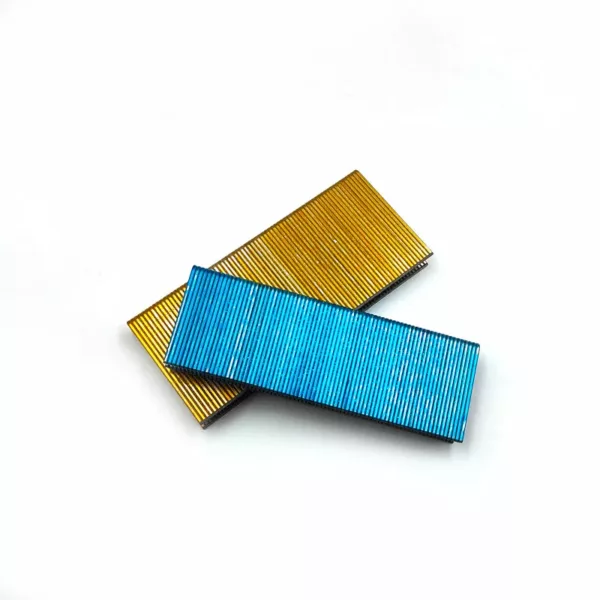Using recycled materials for 20 gauge wide crown staples can have both benefits and potential implications:
- Environmental Benefits: Utilizing recycled materials reduces the demand for virgin resources, conserving natural resources and reducing energy consumption associated with raw material extraction and processing. This contributes to waste reduction and promotes a circular economy by diverting materials from landfills.
- Cost Savings: Recycled materials are often more cost-effective than virgin materials, offering potential cost savings for manufacturers of 20 gauge wide crown staples. This can help reduce production costs and improve profit margins, especially if the cost of virgin materials is high.
- Market Demand: Consumers and businesses increasingly prioritize sustainability and environmental responsibility. Using recycled materials for 20 gauge wide crown staples can appeal to environmentally conscious customers and enhance the brand’s reputation for sustainability, leading to increased market demand and sales.
- Regulatory Compliance: Many regions have regulations and incentives promoting the use of recycled materials and waste reduction. Utilizing recycled materials for 20 gauge wide crown staples can help manufacturers comply with environmental regulations and demonstrate corporate social responsibility.
However, there are also potential implications of using recycled materials for 20 gauge wide crown staples:
- Quality and Consistency: Recycled materials may vary in quality and consistency compared to virgin materials, which can affect the performance and reliability of 20 gauge wide crown staples. Manufacturers must carefully evaluate and test recycled materials to ensure they meet required specifications and performance standards.
- Material Contamination: Recycled materials may contain impurities, contaminants, or residues from previous use, which can compromise the quality and integrity of 20 gauge wide crown staples. Proper cleaning and purification processes are necessary to minimize material contamination and maintain product quality.
- Mechanical Properties: Recycled materials may have different mechanical properties, such as strength, durability, and flexibility,20 gauge wide crown staples compared to virgin materials. Manufacturers must assess the impact of using recycled materials on the mechanical performance of 20 gauge wide crown staples and ensure they meet required strength and reliability requirements.
- Supply Chain Reliability: Dependence on recycled materials for 20 gauge wide crown staples may introduce supply chain risks associated with fluctuations in material availability, quality, and pricing. Manufacturers should diversify their supply sources and establish robust supply chain management practices to mitigate these risks.
- Perception and Market Acceptance: Some customers may perceive products made from recycled materials as inferior or of lower quality compared to those made from virgin materials. Manufacturers must educate consumers about the benefits of using recycled materials and address any concerns about product performance and durability.
Overall, while using recycled materials for 20 gauge wide crown staples offers environmental and economic benefits, manufacturers must carefully consider and manage the potential implications to ensure product quality, performance, and market acceptance.
